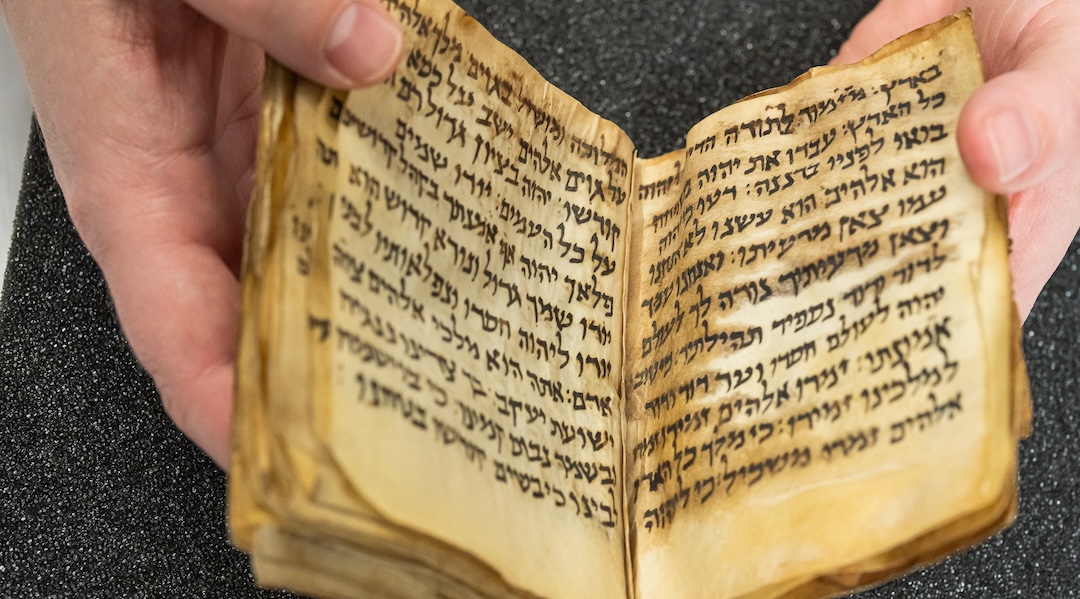Museum of the Bible unveils world’s ‘oldest Jewish book’ in new exhibit
The handwritten manuscript of prayers and poems dates back 1,300 years and originates with Jews who lived in a Buddhist civilization in what is now Afghanistan

Named the Afghan Liturgical Quire, some believe it is the oldest Jewish book in existence. (Museum of the Bible)
(JTA) — In a new exhibit opening Tuesday, the Museum of the Bible in Washington, D.C., has unveiled what it says is the oldest Jewish book ever discovered.
According to the museum’s dramatic claim, the tiny book is a relic of an 8th-century civilization on the ancient trading route known as the Silk Road, created by Jews living as a minority among Buddhists who ruled the Bamiyan Valley in modern-day Afghanistan.
Measuring five inches by five inches, the book combines a variety of texts written by different hands, including prayers, poems, and what the museum says is the oldest known version of the Haggadah, the central text of the Passover seder.
The museum’s claims regarding the book are based on years of work by a team of researchers, but the exhibit is opening before those scholars have been able to publish their findings. The research is slated for release by Brill, a prominent Dutch academic publisher, in the form of 10 essays in April.
The exhibit’s co-curator Sharon Mintz acknowledged that until the scholarship comes out, it will be difficult for those working in the wider field of Jewish manuscripts to fully accept the museum’s story. But she projected confidence.
“The Brill book will lay all doubts to rest,” Mintz told the Jewish Telegraphic Agency.
By then, the exhibit will travel in New York where it will be on view at the library of the Jewish Theological Seminary, according to Mintz.
Anchoring the scholarly discussion surrounding the book is a 2019 laboratory test that used carbon dating to estimate the book’s age at 1,300 years, astonishing researchers at the museum. Far more ancient written Hebrew texts had been discovered, but only on scrolls, most famously the roughly 2,000-year-old Dead Sea Scrolls that are displayed prominently in Israel. The carbon dating indicated that this was the earliest intact Hebrew codex by more than a century.
Prior to the drama of the lab’s result, the book had garnered little interest in the decades since it was first found in Afghanistan.
A member of the country’s Hazara ethnic minority discovered the manuscript in 1997 in a cave near one of the giant Bamiyan Buddhas that were carved into a mountain in ancient times and deliberately destroyed in an explosion by the Taliban in 2001, according to an article in the Free Press.
Sometime later, someone reportedly tried without success to sell the book in Dallas, Texas. Then, following the 9/11 attacks and the U.S. invasion of Afghanistan, the book’s tracks disappeared until 2012, when a rare book dealer photographed it in London.
The dealer, Lenny Wolfe, told the Free Press that he tried brokering a $120,000 deal between a pair of private sellers and an unspecified Israeli institution, but that the institution turned down the offer.
Eventually, the Green family, evangelical Christians based in Oklahoma who own the Hobby Lobby chain, bought the book without knowing its true age or origin, and added it to a collection that would evolve into the Museum of the Bible. It was mislabeled, “Egypt, circa 900 CE.”
A museum curator who was examining the book realized that its real origin was Afghanistan when he encountered a photo of the book in an article in Tablet magazine about Jewish manuscripts being smuggled out of the country.
That discovery eventually led to the carbon-testing and the revelation of the book’s unique significance.
The museum, which has been working to rehabilitate its reputation after a looted antiquity scandal and allegations of misrepresenting Jewish texts, took pains to earn the blessing of a variety of stakeholders ahead of the exhibit.
A museum press release names among its partners the democratically elected government of Afghanistan, which is currently not in power, as well as several Jewish groups: the Afghan Jewish Foundation, the American Sephardi Federation, and Congregation Anshei Shalom, a synagogue founded by Afghani Jews in Queens.
“Were it not for the extraordinary efforts of the Museum of the Bible, the age and even the origins of the world’s oldest Jewish book would have been forever lost,” The American Sephardi Federation said in a statement.













